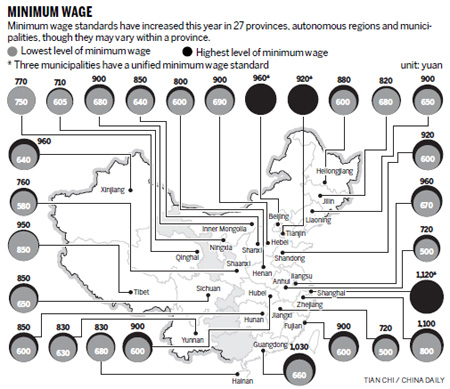China
Chinese workers take home larger pay packets
By Chen Xin (China Daily)
Updated: 2010-08-19 14:07
 |
Large Medium Small |
BEIJING - Northwest China's Qinghai province has announced that its minimum wage will increase by 28.8 percent on average beginning in September, becoming the 27th province in the country to make the move this year.
The province will raise its minimum monthly wage from 580 yuan ($85) to 770 yuan. The minimum hourly wage will be increased from 6.3 yuan to 8.3 yuan.
Since the eastern province of Jiangsu raised its minimum wage this February, 27 provinces, autonomous regions and municipalities have followed suit.
So far only the Guangxi Zhuang autonomous region, Guizhou and Gansu provinces and Chongqing municipality have yet to increase their minimum wage standards, but they have already made plans to do so, the Beijing News reported on Wednesday.
Currently, the minimum monthly wage standard in Shanghai, which was reset in April to 1,120 yuan, is the highest in China.
Beijing has the highest minimum hourly wage of 11 yuan.
|
 |
The southernmost island province of Hainan made the highest increase of 37 percent, from 480 yuan to 830 yuan.
Different regions within each province have different minimum wages. According to a regulation by the Ministry of Human Resources and Social Security, provincial governments should adjust their local minimum wage standards at least every two years. However, the ministry permitted a temporary suspension of wage increases in November 2008 due to the global financial crisis.
"The minimum wage adjustment is a dynamic mechanism. It should have been made much earlier since the Chinese economy rebounded quickly after the crisis," Yang Yansui, a labor expert with Tsinghua University, said on Wednesday.
"But it is a signal that the government has started to pay more attention to the majority's basic income."
Low consumption will restrain the country's steady economic development, Yang said, adding that the raise of minimum wages could help digest the surplus products in some industries.
Labor shortages and strikes in southern provinces earlier this year have provided momentum for the wage increases, said Zhang Yi, a researcher for the institute for population and labor economics at the Chinese Academy of Social Sciences.
"Although almost all of the minimum wages increase across China were higher than 20 percent, they will have no big impact because the standards were too low in many regions," Zhang said.
While employees' salaries were already higher than the minimum wage standards in many places, in some remote areas female employees in some service industries ,such as restaurants and hotels, still have wages lower than the previous minimum standards, Zhang said.
"The raises could be good news for them. The adjustments could also provide a guarantee for employees seeking to protect their rights when their wages are underpaid," Zhang said.
Yue Jinglun, a professor at Guangzhou-based Sun Yat-Sen University, said the minimum wage increases mean that low-income employees could get more endowment insurance deducted from their wages.
In China, a certain ratio of money is deducted from a worker's monthly wage and deposited as endowment insurance. The more endowment insurance deducted, the more money that person could get after retirement.
Chen Gang, 25, from Central China's Hubei province, who now works at a cell phone manufacturer in Shenzhen, Guangdong province, said he is satisfied with his current salary, especially after the city raised the rate of minimum salaries by more than 20 percent in July.
China Daily